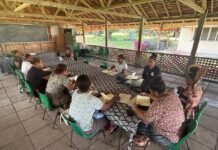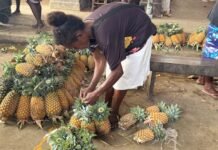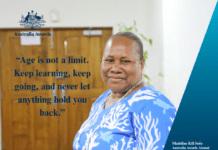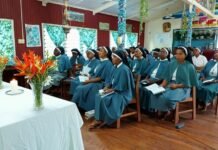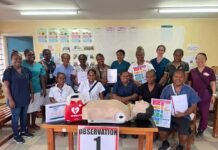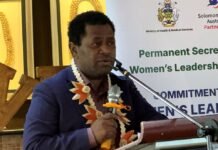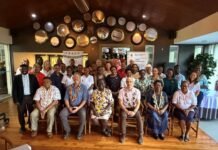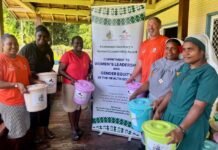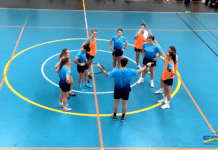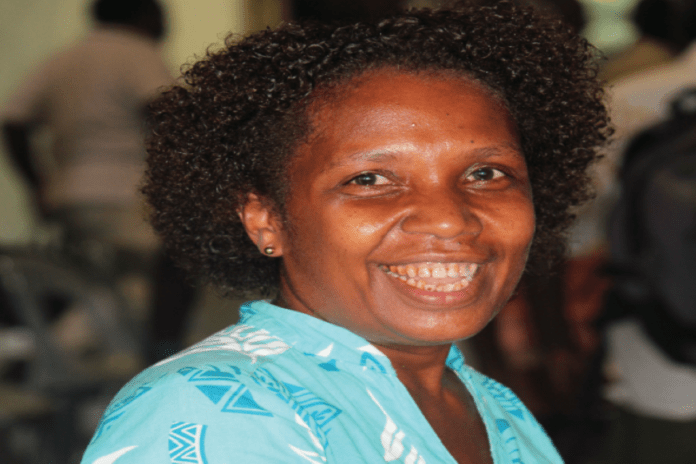BEING a politician is not an easy job. It requires hard work, can be challenging and one has to be committed to meet objectives and goals as set out by the government for its people.
And for a woman to get to join the local government as a politician, the challenges she face could be even more.
Former Member of Guadalcanal Provincial Assembly for Birao Ward in East Guadalcanal, Ileen Sulukonina spoke to ROMULUS HUTA OF SOLOMON WOMEN’S NEWSPAPER about her life and experiences as a former woman politician and how she thinks women should be fairly represented in parliament.
Ms Ileen Sulukonina was the former Provincial Ward member for Birao in East Guadalcanal. She beats all the odds to be elected into the Guadalcanal Provincial Assembly in 2010.
During that time, she was the sole female representative among 20 men in the Guadalcanal Provincial Government’s 21 wards.
During her one term in local government politics from 2010 to 2014, Ms Sulukonina being a woman and peace-leader, she brings with her participatory, mediation, negotiation, cooperative and nurturing leadership traits, among many others.
Whilst she did not wish to be a politician one day in life, as a young adult growing up, situations and conditions she and her people face every day inspired her to join politics.
“Politics give you the power and the authority to do anything. Helping people was primary aim. So I used my political status and influence to assist my people,” she said.
Emerging from a very simple background, Ms Sulukonina, now 38, was born in 1977 and her parents hailed from Guadalcanal and Malaita. Though her father is from Malaita, she was raised at her mother’s place in Guadalcanal.
She said as a young person growing up, she involved a lot in youth and community affairs working as a volunteer.
“I really enjoyed working as a volunteer and this is what shaped and moulded me as a person.”
Ms Sulukonina said going into politics in 2010 was the biggest decision of her life. This is because she knew during that time her own uncle was their representative for their Ward in the Guadalcanal Provincial Assembly.
“Although I was competing with my own relatives, that is, an uncle, who was the reigning member, and an aunty, who lived overseas and had the funds, I was able to strategize my campaign by focusing on what the “male members” hadn’t achieved previously, and organized activities that helped women and youths, the profits of which would eventually cascade into their families.”
As opposed to men candidates, Hon. Sulukonina had to seek permission and get blessings from the traditional Chiefs, her family, church, women’s groups and even her competitors (uncle and aunty) to stand for provincial elections for the Ward.
“Community’s association for the candidate is of utmost importance – I didn’t have the ‘material handouts’, instead talked to them about what “men candidates” hadn’t achieved, for instance, lack of transparency and accountability in their reporting; lack of understanding of their roles leading to poor leadership, being gender-insensitive in their approaches leading to one-sided decisions and profit-seeking rather than implementers.”
“In 2010 I became a Provincial member and sometimes I faced challenges and criticism but I manage to overcome those situations and until today, every one love me and during my time as Provincial member, I worked closely with women and children in the communities. I am very happy to when I see a lot of women attended this program and I want to urge everyone not to give up but to move on further in life. Even though we faced challenges, bear in mind that there is someone out there that has concern for us.”
Challenges
“Challenges to serving the people have also surfaced in way of negative attitudes toward my ideas during the GPG meetings”, says Ms Sulukonina. “I am unable to express my entire views and feelings towards issues as all other members are male, including the Premier, who often states that “we respect women and that they were not being neglected.”
“If they maintain that they respect us women, then what’s stopping them to listen to our views and take our good ideas on board?” she questioned.
“Most members do not understand gender-responsive budgeting and thus no programs are specifically designed or have allocations to cater for this group. For instance, during 2010, following the ‘tensions’, I organised a sporting event. Although there was high turnout, no women participated as the sport only catered for men’s soccer. There was a lot of opposition among the members when I called for women and girls to be included. They feared for more tension, but in fact women are the ones who have led as peacemakers and bring about that leadership, among many other traits of good leadership in decision-making.”
Ms Sulukonina added that whilst women’s involvement in peace leadership was recognised by men, they tended not to support or be biased toward other forms of leadership and empowerment of women.
The attitude of “big man” leadership, cultural and traditional association of men (and not women) being at the helm of clans, churches and other communal and or traditional systems of leadership have all contributed negatively towards efforts to increasing inclusion and participation of women at all decisionmaking levels across sectors.
After being elected in 2010 as a Provincial Assembly Member for the Birao Ward, she was harassed by other fellow male members, while her own ward members who lived in Honiara requested for money.
However, as time passed with numerous successful projects for her community, members returned to apologize for their behaviour.
“I was even harassed by my uncle’s wife, but later received an apology from my uncle who encouraged me to be strong.” Other attitudes amongst both men and women were: leadership should be reserved for old men and men generally who were believed to be physically strong. And because of this i.e. the age factor with most elected members being over 50yrs, they tend to be inactive and do not focus on empowering youth (boys and girls) to be future leaders. Due to the attitude that leadership should be reserved for older men and men in general, Hon.Suluknonia used this to her advantage.
“I was able to turn this aspect into a good campaign strategy and get votes from both the women and youths and men who believed in empowerment and a motivated community. Although I am not physically strong, I would fight using my voice, and bring about the necessary change.”
“In many communities, where the elected reps and MPs are male, women, youth and even some men find it difficult to share views, concerns and ideas due to their strong status quo. Women leaders, because of their different styles of leadership, including being co-operative, participatory and nurturing, are able to bring the communities closer by being more approachable and achieve shared goals. Thus most women, youth and some men tend to communicate with me”.
Soon after the tension, Ms Sulukonina was able to help make peace with the community (her Ward), also MP Constituency to help the Member of Parliament designate to make a visit. She stated that a cordial relationship with the MP was important as they are able to channel funding and thus increased development work for their Wards, which eventually benefitted the people. ‘I also seek advice and have a good working relationship with my uncle, who lost the elections. Most Ward members are unable to work with former colleagues mainly due to clashing ideology and mandates, although they are part of the community they serve.’
“I am also able to successfully negotiate specific projects such as solar powering, installation of water tanks and generators for the villages from the donors. I have put in place a good project monitoring and a reporting back system, thus there is accountability and transparency in the work we do.” I also ensure that both men, women and youth benefit, thus the donors are happy with the approach and do not hesitate to assist,’ she adds.
“On various other support, Ms Sulukonina said “SINCW, Vois Belong Meri and MYWCA who supports capacity building for aspiring women candidates also need to fully understand the context of gender issues and how to get the support of the men and the voters. The challenges are huge, but can be overcome, if the right approach is taken.”
The former woman member strongly believes that given the opportunity, women can and will make a change at all levels and sectors, contributing positively toward national and provincial development. I met the former woman politician her during a weeklong consultations meeting on the second 2014 draft of the federal constitution of Solomon Islands last week.
The meeting was organised by the Constitutional Reform Unit (CRU), a department within the Office of the Prime Minister and Cabinet.
The meeting was basically to get feedbacks on the federal constitution of Solomon Islands draft and it brings together local government leaders, women and youth reps and other community leaders from parts of Guadalcanal.
As one of the outspoken woman leaders during the constitutional awareness meeting, she raised several key women’s issues during consultations.
One of the issues she was vocal about was the Temporary Special Measures (TSM) for women to have reserved seats in parliament. She said women should be given a voice at the national legislative level.
“Over the past 30 years, women have not been considered in most decisions reached by lawmakers. “We need a change,” she said.
Ms Sulukonina hopes that the new federal constitution of Solomon Islands is considered by the government and adopted by Solomon Islands.
The operations and functions of the newly proposed federal constitution are a bit different from the Unitary System that Solomon Islands is currently operating on.
The federal constitution will enable local governments or provincial governments to manage their own affairs as a state, also with provisions in the constitution to have more power of sovereignty over any development undertaking that is proposed for their provinces. The system will also empower local chiefs’ council and give each state power and full control over their resources.
Ms Sulukonina said federal constitution is the only way forward. “I think it’s time that we should go into state government. I have seen a great potential in this to address women’s issues.”








